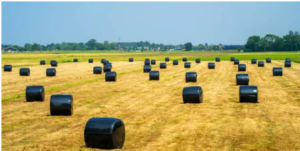An effective silage wrap for farming Australia is essential in protecting forage from spoilage financially and for livestock’s wellbeing. An optimal quality roll should provide consistent thickness, puncture resistance, and UV protection to keep spoilage at bay and help ensure its integrity over time. Insufficient or improper quality wrapping may result in spoilage, leading to financial losses and risks to animal health.
Wrapping immediately following baling is recommended to prevent fermentation and leaks. Storing wrapped bales on washed gravel is also highly recommended to minimise leakage issues.
It is a sustainable product.
 Silage wrap is an indispensable component of any successful livestock farming operation, as improperly wrapped bales will quickly spoil and lead to lost profits. High-quality silage wrap can block heat and oxygen and help prevent mould growth and rodent infestation. Additionally, silage wrap protects bales from rodents infiltrating them – assisting farmers to maintain profits and remain compliant with animal health laws.
Silage wrap is an indispensable component of any successful livestock farming operation, as improperly wrapped bales will quickly spoil and lead to lost profits. High-quality silage wrap can block heat and oxygen and help prevent mould growth and rodent infestation. Additionally, silage wrap protects bales from rodents infiltrating them – assisting farmers to maintain profits and remain compliant with animal health laws.
Coveris has unveiled a clear film to help farmers monitor and reduce silage quality while cutting costs for recycling. Made of high-grade plastic, the clear film allows farmers to monitor silage quality while cutting recycling costs. Plus is easier to use and deters birds than black silage wrap.
It is easy to use
Silage wrap for farming Australia is an easy, hassle-free solution for protecting bales of forage from pests and loss of nutrients while saving time and money by eliminating the need to store them in buildings. However, not all silage wrap products are equal; different films contain different layers with differing UV protection levels, tactiness (stickiness) levels, puncture resistance capabilities, etc, that affect performance.
To maximise the potential of your silage harvest, choose a high-quality bale wrap made from durable materials that have UV-protective ingredients applied and stored in shaded areas. It should also be applied correctly to create an airtight seal and guarantee strong seal performance and air-tightness. Finally, store wrapped bales on washed gravel to minimise vermin invasions and moisture damage, helping ensure an abundant harvest with more sugar for proper fermentation.
It is durable
Silage wrap is an invaluable tool for farmers looking to preserve and protect their crops, helping reduce costs and improving feed quality. Constructed in multiple layers to a specific thickness, silage wrap blocks oxygen, air, penetration and white mould formation in your forage feed, allowing it to maintain its shape over time.
When purchasing silage wrap for farming Australia, it must be puncture-resistant and easy to apply. Skimping on quality can lead to spoilage of crops as well as lost value.
It is affordable
Silage wrap for farming provides a cost-effective and eco-friendly solution to preserve hay bales and other forage crops. Constructed of recyclable linear low-density polyethylene (LLDPE), the wrap is easy to use while providing puncture, abrasion and UV protection – saving the planet with every bale preserved!
Bales left exposed can quickly spoil, leading to financial losses and health risks for livestock. To mitigate this problem, farmers should choose high-quality silage wrap that provides an airtight seal to safeguard its contents – such as silage film, which offers multiple options at an affordable price.
When it comes to protecting and preserving baled forage, the type of silage film you choose can have a significant impact on the overall quality of your feed. The right wrap can protect against spoilage, reduce the amount of time you have to spend wrapping, and even make your forage more profitable.
The thickness and strength of the silage wrap you use are important, as is its ability to create an oxygen barrier. Insufficient oxygen ingress can lead to the loss of valuable nutrients and cause spoilage in your forage. The best silage wrap films are thick, strong and durable. They should also be UV-treated to prevent damage from the sun.
There are many different types of hay wraps available on the market, but not all of them are created equal. Some are designed to break down faster in the field, while others can last up to 18 months or longer. The type of material used to produce the film is another factor that can determine how well it performs in the field.